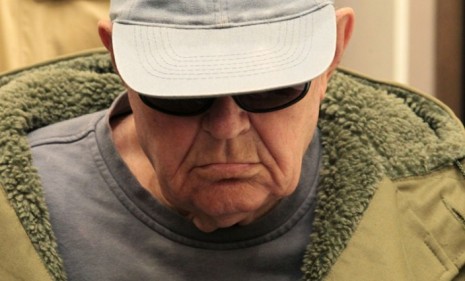Why is Germany hunting Nazis again?
The conviction of former death-camp guard John Demjanjuk opens the door to prosecuting hundreds of others like him: An instant guide

A free daily email with the biggest news stories of the day – and the best features from TheWeek.com
You are now subscribed
Your newsletter sign-up was successful
German prosecutors are reopening hundreds of dormant investigations of former Nazis — most, if not all, of whom are well into their 80s and 90s. Why now? Here, a brief guide:
Who are these suspects?
Nazi death camp guards, mostly. Prosecutors had previously dropped the cases of these and other low-ranking former Nazis because courts were unwilling to convict them of war crimes if there was no proof that they actually killed a specific prisoner. But that has changed since May, when former U.S. autoworker John Demjanjuk was convicted by a German court on 28,060 charges of accessory to murder for serving as a guard at the Sobibor death camp in Nazi-occupied Poland.
The Week
Escape your echo chamber. Get the facts behind the news, plus analysis from multiple perspectives.

Sign up for The Week's Free Newsletters
From our morning news briefing to a weekly Good News Newsletter, get the best of The Week delivered directly to your inbox.
From our morning news briefing to a weekly Good News Newsletter, get the best of The Week delivered directly to your inbox.
How did that change the other cases?
Though no direct evidence established that Demjanjuk, now 91, had murdered a specific prisoner, he was a guard at Sobibor — a camp established for the sole purpose of exterminating Jews from Poland, France, Germany, Holland, and Czechoslovakia, as well as Soviet prisoners of war. The prosecution argued successfully that anyone who worked there did so knowing that they were part of a death machine. Demjanjuk, who was sentenced to five years, denies he ever served as a guard and is appealing. But prosecutors aren't waiting for the case to be resolved before going after the others.
Why the rush?
Demjanjuk's appeal, which is needed to settle the precedent, could take a year, and the former Nazi guards aren't getting any younger. The youngest would now be in his 80s, and most are already dead. "We're preparing everything now so that as soon as there is a final decision, we can move immediately with charges," says Kurt Schrimm, Germany's head Nazi war-crime prosecutor. "We cannot wait for the outcome of any appeal, it would take too long and we would lose valuable time."
A free daily email with the biggest news stories of the day – and the best features from TheWeek.com
How many cases are we talking about?
Efraim Zuroff, the Simon Wiesenthal Center's top Nazi hunter, says there were roughly 4,000 people who either worked at the four camps built solely for killing — Sobibor, Belzec, Chelmno, and Treblinka — or who were involved in the Einsatzgruppen death squads. Of those, there are probably fewer than 1,000 still living, prosecutors say. But even prosecuting just a few dozen people would be an "incredible" victory, Zuroff says. "Our goal is to bring as many people to justice as possible," he tells the Associated Press. "They shouldn't be let off if they're less than Mengele, less than Himmler."
Sources: Haaretz, Associated Press, The Local, London Evening Standard
-
 6 of the world’s most accessible destinations
6 of the world’s most accessible destinationsThe Week Recommends Experience all of Berlin, Singapore and Sydney
-
 How the FCC’s ‘equal time’ rule works
How the FCC’s ‘equal time’ rule worksIn the Spotlight The law is at the heart of the Colbert-CBS conflict
-
 What is the endgame in the DHS shutdown?
What is the endgame in the DHS shutdown?Today’s Big Question Democrats want to rein in ICE’s immigration crackdown